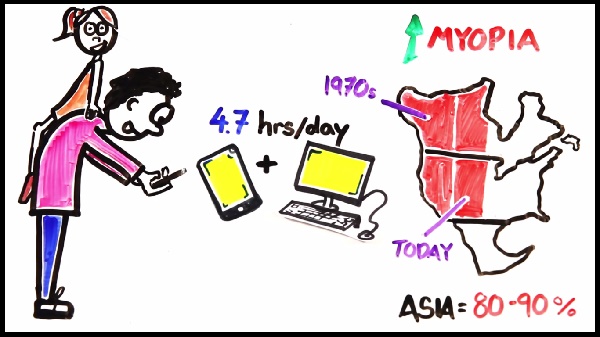7
billion people on Earth, roughly 6 billion own a cell phone, which is pretty
shocking, given that only 4.5 billion have access to a working toilet.
So
how are these popular gadgets changing your body and brain?
If you're looking down at your phone right now, your spine angle is equivalent to that of an 8-year-old child sitting on your neck, which is fairly significant considering people spend an average of 4.7 hours a day looking at their phone. This, combined with the length of time spent in front of computers has led to an increase in the prevalence of myopia or nearsightedness in North America.
During
the 1970s about 1/4 of the population had "myopia", where today,
nearly half is doing; and in some parts of Asia, 80-90% of the population is
now nearsighted.
And it can be
hard to put your phone down - take for example the game Candy Crush. As you
play the game, you achieve small goals causing your brain to be rewarded with
little bursts of "dopamine" - and eventually, you are rewarded with
new content. This novelty also gives little bursts of dopamine and together
create what is known as a "compulsion loop". Which just happens
to be the same loop responsible for the behaviors associated with nicotine or
cocaine.
Our
brains are hard-wired to make us novelty seeking, and this is why apps on our
phones are designed to constantly provide us with new content, making them hard
to put down.
As
a result, 93% of young people aged 18-29 report using their smartphones as a
tool to avoid boredom, as opposed to other activities such as reading books or
engaging with people around them. This has created the new term
"nomophobia" - the fear or anxiety of being without your phone.
We
also see a change in brain patterns: alpha rhythms are commonly associated with
a "wakeful relaxation" like when your mind wanders off, whereas gamma
waves are associated with conscious attentiveness. And experiments have shown
that when a cell phone is transmitting - say during a phone call - the power of
these alpha waves is significantly boosted, meaning phone transmissions can
literally change the way your brain functions.
Your
smartphone can also disrupt your sleep! The screen emits a blue light which has
been shown to alter our circadian rhythms, diminishing the time spent in deep
sleep, which is linked to the development of diabetes, cancer, and obesity.
Studies
have shown that people who read on their smartphone at night have a harder time
falling asleep and produce less melatonin - a hormone responsible for the
regulation of sleep-wake cycles.
Harvard medical school advises the last 2-3 hours before bed be 'technology free, so pick up a book before bed instead.
Of course, smartphones also completely change our ability to access information - most notably in poor and minority populations.
So
while phones are in no way exclusively bad, and have been a part of positive
change in the world, there's no denying that they are changing us.
But,
many successful people have now decided to take a “smartphone vacations” in
order to increase productivity.


















0 comments:
Post a Comment